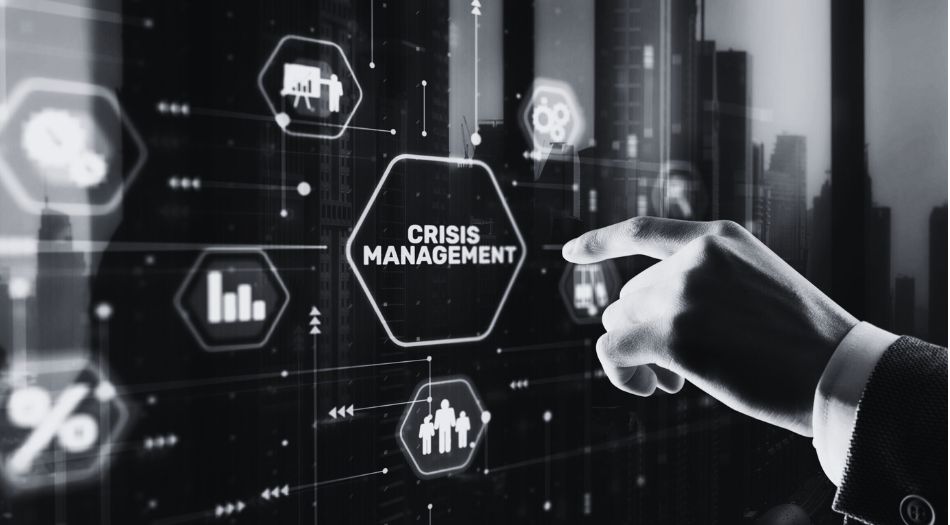Key Takeaways
- Effective crisis leadership requires leaders to be adaptable, decisive, and maintain transparent communication, much like a skilled sailor navigating through a storm.
- Proactive crisis management strategies involving risk assessment, strong communication protocols, and cultivating a culture of preparedness are critical for organizations to weather future crises and resume normal operations quickly.
- Crisis management extends beyond external emergencies, including the ability to handle internal scandals with accountability, communicate effectively, and ensure mental health and emotional resilience among leaders and teams.
Navigating the Storm: Key Principles of Crisis Leadership
“As leaders, navigating crises is not merely about weathering the storm; it’s about emerging stronger on the other side. At Scandal Coach, we understand the intricate balance between resilience and strategic action. Our approach to crisis management empowers leaders to navigate challenges with unwavering confidence, turning adversity into opportunity. With our guidance, leaders can master the art of crisis management, leading their teams through turbulent times with grace and resilience.”
Crisis leadership is akin to the art of sailing in stormy weather. The leader, like a seasoned sailor, needs to display confidence to assuage the team’s fears while maintaining clear communication and quick decision-making. The leader’s demeanor during a crisis is pivotal in preserving organizational morale and effectiveness, setting the tone for a determined response. Just as a sailor needs to be agile to navigate the unpredictable winds and waves, a leader must display adaptive, agile, and decisive traits to manage crises effectively.
Transparent communication is the compass that guides the ship through the storm. Leaders must be honest about the gravity of the crisis, neither understating nor overstating the situation. This clear communication fosters trust among employees and keeps everyone on the same page, mitigating the potential for chaos and confusion.
The ability to make quick and effective decisions is another indispensable trait in crisis leadership. This agility empowers the workforce to recognize and address potential future crises promptly, building organizational resilience. Just as a sailor must make swift decisions to navigate through a storm, a leader must also be quick on their feet when a crisis strikes. Possessing these leadership qualities is essential for success in managing emergencies.

The Role of Composure in Crisis Management
Much like a composed sailor instilling confidence in their crew amid a storm, leaders can alleviate anxiety and foster stability during crises. Effectively managing emotions allows leaders to:
- Uphold team morale and focus
- Curb chaos and anxiety among employees
- Play a crucial role in mitigating the psychological impact on employees during a crisis
This calm demeanor plays a crucial role in mitigating the psychological impact on employees during a crisis, much like a steady hand on the ship’s wheel in stormy seas.
Especially in high-stakes fields like life sciences, composure allows leaders to:
- Maintain necessary focus and attention to detail
- Stay calm under pressure
- Support clear thought processes
- Make informed decisions amidst the whirlwind of a crisis.
Clear Communication: Keeping Everyone on the Same Page
As a ship’s crew depends on their captain for clear, timely communication, so do employees rely on their leaders in times of crisis. Before a crisis hits, leaders ought to evaluate their existing communication protocols to secure clarity and avoid possible organizational setbacks. Clear communication is achieved by:
- Broadcasting messages broadly, repeatedly, and through multiple channels for better reception and understanding.
- Proactive communication to address potential questions.
- Providing clear and concise updates from reliable sources.
- Adapting to the specifics of the crisis and team capabilities.
Leaders can foster trust, alleviate stress, and provide necessary documentation during a crisis by empathetically listening to team concerns and making use of relatable, written communication. As leaders respond to these concerns, they create a supportive environment for their team.
The Art of Quick Decision-Making
Much like how awaiting additional information during a storm can lead to disastrous outcomes, delaying decisions during a crisis might result in adverse consequences. Being decisive is crucial as hesitation can be costly, and conditions rapidly change. Leaders must think on their feet to identify pressing issues and prioritize solutions effectively and efficiently.
Small but critical choices made during a crisis can have significant and far-reaching consequences. Like a sailor navigating through treacherous waters, leaders exhibiting curiosity, flexibility, and prioritizing the organization’s interests can effectively navigate crises.
Proactive Strategies to Preempt Future Crises
“At Scandal Coach, we believe that the best way to handle a crisis is to prevent it from happening in the first place. Our proactive strategies empower individuals and organizations to anticipate potential challenges, identify vulnerabilities, and implement preemptive measures. By taking proactive steps to preempt future crises, leaders can safeguard their reputation, protect their stakeholders, and maintain trust and credibility in the face of uncertainty.”
Like seasoned sailors who study weather patterns and devise strategies to avoid future storms, leaders too need to proactively plan for potential crises. These contingency plans, including business continuity and emergency response plans, are essential action plans that help organizations resume normal operations following disruptions. The development of effective contingency plans begins with asking ‘what if’ scenarios about potential crisis events and then identifying and prioritizing risks to manage them efficiently.
A comprehensive contingency plan outlines detailed steps to:
- Prevent crises
- Respond to crises
- Manage crises
- Delegate responsibilities
- Plan for a full recovery
Business Continuity Plans (BCP) should be created in tandem with Crisis Management Plans (CMP) to ensure uninterrupted operations during a crisis and provide effective recovery strategies. These plans are like the lifeboats on a ship, ready to be deployed when a crisis strikes. This proactive approach to crisis management, combined with risk management, cultural change initiatives, and authentic leadership, reinforces an organization’s resilience against future crises.

Risk Assessment and Management
Just as a sailor conducts a thorough evaluation of potential risks before setting sail, leaders too need to conduct risk analysis. This involves discussing potential risks, analyzing their impact, and proposing actions to increase preparedness. Various risk assessment methodologies can be applied, including quantitative, qualitative, semi-quantitative, asset-based, vulnerability-based, or threat-based approaches. Each methodology has its pros and cons, but all aim to provide a clear understanding of potential risks and their impacts on the organization.
An effective crisis management plan should include a detailed risk analysis, outlining potential crisis scenarios and their impacts. A Business Impact Analysis (BIA) further helps understand how business functions would respond to unexpected events by looking at revenue affected by potential risks.
Cultivating a Culture of Preparedness
A culture of preparedness is fostered by:
- Emphasizing core organizational values during communication
- Providing stability and guidance
- Achieving buy-in for preparedness planning throughout the organization, supported by leadership accountability
This culture is akin to a well-trained crew, ready to handle any storm that comes their way. It is crucial for the effective alignment of actions with organizational values.
Just as a sailor ensures all safety equipment is in place before embarking on a journey, business leaders must ensure that contingency plans are in place to reduce recovery times and costs, and boost stakeholder confidence, thereby justifying their economic importance for business resilience.
Technical skill enhancement and targeted training of teams are fundamental to ensuring quick and effective execution of contingency plans during an immediate crisis.
Inner Turmoil: Leading Through Personal and Organizational Scandals
“Inner turmoil is often the most challenging aspect of navigating personal and organizational scandals. At Scandal Coach, we understand the profound impact that such crises can have on leaders, both personally and professionally. Our holistic approach addresses not only the external repercussions but also the internal struggles faced by individuals during turbulent times. By providing guidance, support, and strategies for self-reflection and growth, we empower leaders to navigate their inner turmoil with resilience and emerge stronger from the experience.”
Crisis leadership is not just about navigating external storms, but also about managing the internal turmoil that accompanies scandals. This includes facing the challenges and dynamics within the organization beyond public perception. Leaders must:
- Openly admit to organizational scandals, demonstrating their understanding of the impact of unethical behavior on the organization and communicating this understanding to the team.
- Address any breaches of conduct among the crew, just as a ship’s captain must do.
- Address any lapses in integrity within the organization.
Consistent punishment of violators, along with strategic recruitment of managers committed to integrity, is essential in restoring organizational values during scandals. A strong leadership presence and established organizational culture that outrightly rejects unethical conduct is more effective in preventing crises than passive reliance on compliance standards. This is akin to maintaining discipline and order on a ship, which is critical for its smooth sailing.

Self-Awareness and Accountability
In the face of a storm, a good sailor is aware of their strengths and weaknesses, and knows when to take charge and when to delegate. Similarly, leaders who are self-aware and can self-regulate are better able to maintain composure, make objective decisions during high-pressure situations, and balance accountability with empathy.
Accountable leaders actively accept responsibility when things go awry and are committed to maintaining honesty and integrity within the culture of their organization. Empathy, crucial for leadership during a crisis, is attainable through leadership training that fosters self-awareness and the ability to understand others.
Transparent crisis leadership is rooted in leaders being true to their values, beliefs, and experiences and is a part of the broader journey towards self-improvement and accountability.
Managing the Narrative
Just as a ship’s captain must address the crew and manage their perception of a storm, leaders must also manage the narrative during a scandal. Addressing lapses in integrity by uncovering causes of misbehavior and setting strategies to prevent them is part of managing the narrative during scandals.
Setting strategies to prevent further issues of integrity involves:
- A detailed analysis of the crisis to understand the roots of the problem
- Communicating difficult decisions with far-reaching consequences
- Managing emotional strain and mental well-being
Innovative Leadership Styles for the Modern Crisis
“In times of crisis, traditional leadership styles may fall short in addressing the complexities of modern challenges. At Scandal Coach, we advocate for innovative leadership approaches that embrace agility, empathy, and transparency. By cultivating these qualities, leaders can effectively navigate crises, inspire trust among stakeholders, and steer their organizations toward sustainable success. Our coaching empowers leaders to adopt these innovative leadership styles, enabling them to confront crises with confidence and resilience.”
In the face of a storm, a skilled sailor might employ innovative navigation techniques to guide the ship to safety. Similarly, leaders may need to adopt innovative leadership styles, such as co-creative and quantum leadership, to navigate through a crisis.
Co-creative leadership integrates the organization’s vision with the involvement of team members, inspiring them to take an active role in both embodying and realizing this vision, particularly during crises. This leadership style encourages staff empowerment and participation by allowing for a decentralized decision-making process, giving employees a sense of control and involvement that is crucial during a crisis.
Innovation in problem-solving is fundamental to co-creative leadership, facilitated through meetings that are inclusive of all voices and encourage open dialogue, pushing against traditional command-and-control models.

Co-Creative Leadership in Action
A co-creative leader is like a captain who encourages their crew to contribute ideas and strategies for navigating the storm. This leadership style integrates the organization’s vision with the involvement of team members, inspiring them to take an active role in both embodying and realizing this vision, particularly during crises.
Encouraging teams to submit both creative ideas and identify ‘problems worth solving’ deepens engagement and leverages diverse perspectives for better solutions. Regular reviews of submitted ideas and providing empathetic feedback is crucial for prioritizing and fostering innovators’ growth.
Quantum Leadership: Embracing Complexity
Quantum leadership, on the other hand, prepares leaders to handle crisis situations by promoting a proactive stance and accommodating multiple solutions to problems instead of seeking a single right answer. Just as a sailor understands the interconnectedness of the weather, the ship, and the sea, a quantum leader recognizes how different parts of the organization are interconnected, emphasizing that a change in one area can impact the whole.
Leadership characterized by emotional intelligence and empathy is vital to nurturing a positive team environment, especially during crisis management.
Fostering Innovation and Flexibility in Times of Crisis
“In times of crisis, innovation and flexibility are not just desirable qualities; they are essential for survival. At Scandal Coach, we believe that fostering a culture of innovation and flexibility is paramount to effectively navigating turbulent waters. By encouraging creativity, adaptability, and forward-thinking strategies, leaders can transform crises into opportunities for growth and resilience. Our coaching empowers individuals and organizations to embrace change, explore new possibilities, and emerge stronger from adversity.”
Much like a ship’s crew requires flexibility and innovation to weather a storm, organizations too require adaptability, a spirit of experimentation, and a commitment to continuous learning in crisis management. An innovative culture in times of crisis fosters traits like grit, persistence, and a sense of collectiveness among team members. Effectively navigating uncharted territory in a crisis is accomplished through promoting experimentation and maintaining clear lines of communication.
To steer their teams through the dynamic environment of a crisis, leaders must implement continuous adaptation and actively seek and apply feedback.

Encouraging Team Innovation
In the face of a storm, a ship’s crew that thinks outside the box and comes up with innovative solutions is more likely to survive. Similarly, to boost innovation in times of crisis, leaders should expand opportunity discovery, make the innovation process accessible and flexible, and maintain an always-on channel for idea contribution.
Encouraging teams to submit both creative ideas and identify ‘problems worth solving’ deepens engagement and leverages diverse perspectives for better solutions. Regular reviews of submitted ideas and providing empathetic feedback is crucial for prioritizing and fostering innovators’ growth.

Adapting Leadership Approaches
Just as a sailor adjusts their strategy based on the changing conditions of the sea, leaders must also adapt their approaches during a crisis. This involves:
- Being flexible
- Being present
- Being open-minded
- Focusing on the current situation without being clouded by preconceptions.
Effective leaders, who strive to lead effectively, can benefit from interventions that bolster their sense of self-efficacy, especially when paired with self-regulatory training to manage the risk of exhaustion.
Leaders should strive to:
- Understand and meet the unique needs of each team member during a crisis
- Foster an inclusive and supportive environment
- Offer flexibility without assumptions.
Building Emotional Resilience and Mental Health Awareness
“At Scandal Coach, we recognize the importance of building emotional resilience and promoting mental health awareness, especially in the face of public scrutiny and scandal. Our coaching approach not only focuses on navigating the external challenges of crises but also on strengthening inner resilience and well-being. By fostering emotional intelligence, self-awareness, and coping strategies, we empower individuals to navigate turbulent times with grace and authenticity. Together, we can cultivate a culture of resilience and support that enables leaders to thrive even in the most challenging circumstances.”
Much like a sailor requires mental strength to withstand a storm, a leader’s mental health critically influences their behavior and decision-making during crises. Leaders encounter specific mental health challenges during crises, such as increased work intensification and heightened emotional demands leading to potential health issues like irritation and exhaustion.
Organizational support and leaders’ self-efficacy act as buffers against the adverse effects of work intensification on their mental health. Empathy strengthens crisis leadership by fostering inclusive leadership, enhancing decision-making, and helping to build trust and connection with team members.

Supporting Well-being Among Leaders and Teams
A ship’s crew looks to their captain for reassurance and guidance during a storm. Similarly, a leader’s ability to maintain effective communication during a crisis relies heavily on their own well-being. Quantum leaders promote self-care not just for themselves but as an integral part of their team’s culture. Constructive emotional management and self-care training are crucial for leaders to sustain mental health under emotional demands.
Regular and specific well-being check-ins contribute to a culture of connection and ensure team members feel genuinely supported. Prioritizing the safety and well-being of employees is a key responsibility for crisis-ready leaders, highlighting the need for a supportive team environment.
The Role of Empathy in Crisis Leadership
In a storm, a good captain not only steers the ship but also understands and empathizes with the fears and concerns of the crew. Similarly, empathy is a crucial quality in crisis leadership as it demonstrates care for the team’s well-being and fosters trust.
Self-aware leaders are better able to:
- Recognize and understand others’ emotions, particularly in crisis situations
- Empathetic leaders can connect deeply with team members and guide them more effectively in challenging times
- During a crisis, empathetic leaders make space for team members to express their concerns, fostering an environment of compassion and trust.
Crafting an Agile Crisis Management Plan
“At Scandal Coach, we understand the necessity of crafting an agile crisis management plan in today’s volatile landscape. Our approach emphasizes flexibility, adaptability, and proactive strategizing to effectively address unforeseen challenges and mitigate potential crises. By developing a robust crisis management framework tailored to your organization’s unique needs, we ensure swift and decisive action when faced with adversity. With Scandal Coach by your side, you can navigate uncertainty with confidence and emerge stronger than ever before.”
Much like a ship’s crew that regularly revises and tests their emergency procedures in preparation for a storm, organizations also need to develop agile crisis management plans and regularly test them. However, many organizations do not test the effectiveness of their crisis recovery plans, often due to lack of time or inadequate resources.
With the constantly shifting markets and industries, it is more important than ever for leaders to implement effective crisis management strategies that can evolve with the organization’s needs into 2024 and beyond, especially when a financial crisis occurs or in the face of a future crisis.
Identifying Core Components of a Crisis Plan
Just as a ship’s emergency plan outlines the roles and responsibilities of each crew member, the crisis action plan should include a clear definition of roles and responsibilities using the RACI model to ensure everyone knows their specific duties during a crisis. It should also incorporate a comprehensive internal and external communication plan to maintain coordination among team members and manage public relations and stakeholder communication effectively.
An activation protocol that defines crisis triggers, alongside response action plans tailored to different crisis scenarios, should also be included.
Testing and Refining Your Crisis Response
Just like a ship’s crew conducts regular drills to prepare for possible emergencies, organizations should regularly test their contingency plans and conduct drills to assess their readiness for different crisis situations. Rehearsals and realistic drills reveal any flaws that might be present in the crisis management plan and serve as crucial practices to enhance team coordination and response effectiveness.
Following drills or actual crisis events, post-exercise analyses and after-action reviews provide invaluable insights, leading to vital updates and continuous improvement of the crisis management plan. Monitoring for potential threats needs to be a persistent process; as the business environment evolves, the crisis management plan must be revised to maintain its efficacy and reflect new understandings.
The Stormy Seas of Crisis Management for Leaders
Navigating the stormy seas of crisis management requires a leader who is composed, communicative, and quick to make decisions. It demands proactive strategies to preempt future crises, and the agility to navigate through personal and organizational scandals. It calls for innovative leadership styles that foster a culture of preparedness and flexibility. Above all, it requires building emotional resilience and maintaining mental health awareness, while crafting an agile crisis management plan. The journey may be fraught with challenges, but with these guiding principles, leaders can confidently steer their organizations through any storm.
At Scandal Coach, we’ve witnessed firsthand the devastating effects of unpreparedness of leaders and their organizations in crisis situations. Our mission is to provide guidance and support to those navigating these tumultuous waters, empowering them to emerge from the experience stronger and more resilient. Through our tailored strategies and empathetic approach, we equip leaders to reclaim control of their narrative and forge ahead with confidence.
To discover more about our methodology and how we can assist you in navigating the complexities of crisis management, we invite you to download our guide today. It’s time to seize the reins of your story and chart a path toward a brighter tomorrow.



